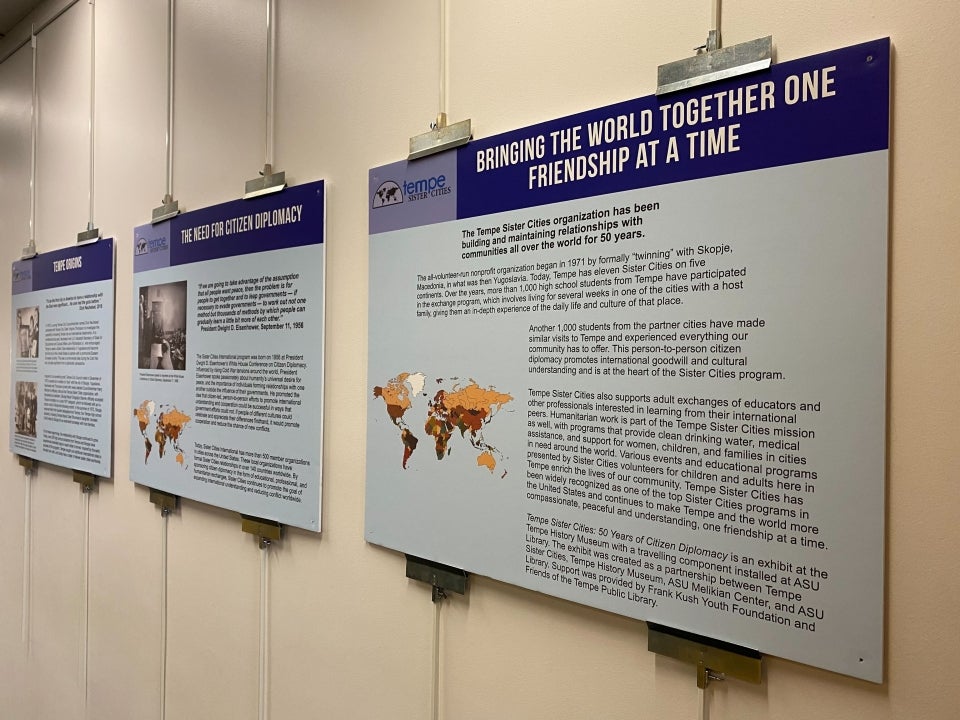'Tempe Sister Cities' exhibit celebrates citizen diplomacy at ASU Noble Library

'Tempe Sister Cities: 50 Years of Citizen Diplomacy' on display at Noble Library on the Tempe campus.
The ASU Library, in collaboration with Tempe Sister Cities and The Melikian Center: Russian, Eurasian and East European Studies, celebrates 50 years of citizen diplomacy in the Sister Cities program.
Visitors to Noble Library on the Tempe campus can explore stories and photographs documenting the program’s history.
The displays illustrate how citizens can function as international diplomats for their countries by fostering high quality one-on-one relationships.
The catalyst for the partnership was a 2018–19 research cluster project with the Institute for Humanities Research led by Keith Brown, director of The Melikian Center.
Alexandra Humphreys, associate liaison librarian for humanities, and Renee James, Greater Arizona Collection curator, joined a team of researchers, librarians, archivists, students and community members to examine “Citizen-Diplomacy, Past and Future: A Case-Study of Tempe Sister Cities, People-to-People International Arizona, and Global Ties Arizona, 1956–2021.”
“The idea evolved into setting up an exhibition that would celebrate the 50th anniversary of Sister Cities and a partnership between the Melikian Center, ASU Library and the Tempe History Museum came from that,” Humphreys said. “Deanna Carrera from the Tempe Sister Cities also joined the partnership by providing materials, logistical help and organizing the opening of the main exhibition in the Tempe History Museum.”
The Tempe Sister Cities program began 50 years ago when Tempe entered into a relationship with Skopje, Yugoslavia (presently North Macedonia), and became the first city in America with a sister city in communist Eastern Europe. Today, Tempe has 11 sister cities on five continents, and continues to promote peace and understanding through international friendship.
The exhibit explores these fascinating and diverse places and shows the history and impact of the Sister Cities program at home and abroad.
"Tempe Sister Cities: 50 Years of Citizen Diplomacy" on display at Noble Library.
This relationship with Skopje has a special connection to ASU. Brown, who also serves as a professor at ASU's School of Politics and Global Studies, has written extensively about the history of the sister city relationship between Tempe and Skopje. And Humphreys also lived in the city for many years.
“In 1963, Skopje was hit with a major earthquake, which killed a lot of people and left about 200,000 people homeless,” Humphreys said. “I knew several people whose relatives, some of them parents and siblings, perished in the earthquake. Seventy-eight nations from all over the world cut across political divisions and offered supplies or took part in rebuilding the city. It was the first time since the onset of the Cold War that American, Soviet and other nations came together to launch a major humanitarian initiative.”
The main exhibit, “Tempe Sister Cities: 50 Years of Citizen Diplomacy,” is located at the Tempe History Museum.
Joshua Roffler, Tempe History Museum curator said, “We’re excited to be able to bring this exhibit to more locations and help promote citizen diplomacy. The Tempe Sister Cities program has had an incredible impact on our city, and we’re excited to share these highlights of the 11 cities with ASU Library visitors.”
The exhibit will be on display on the second floor of Noble Library through October.
More Local, national and global affairs

Study shows that trust drives successful market economies — but not in the way you may think
From fueling our cars to fulfilling daily coffee habits, the average U.S. cardholder makes 251 credit card transactions per year…

Higher education key to US competitiveness, security
ASU President Michael Crow’s notion of universities as public service institutions — places that serve society in practical and…

Military program leaders learn about breadth of ASU's defense-focused initiatives
Arizona State University seeks to be the U.S. military’s top partner in strategic learning and innovation. To advance this vision…


